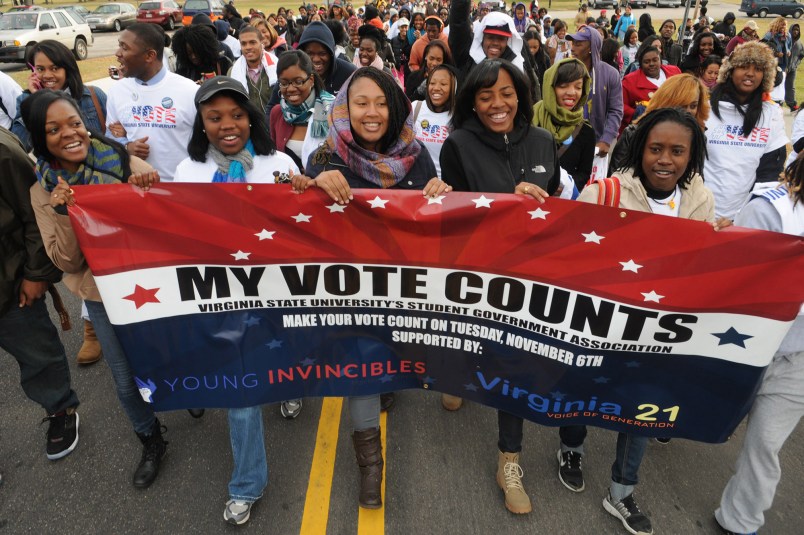Virginia’s State Board of Elections is asking the court weighing a voting rights case being brought in the state to exclude any evidence of the state’s history of racial discrimination.
The board filed a motion Monday to “exclude expert testimony and other evidence of Virginia’s history of racial discrimination,” particularly anything that happened before 1965, when the federal Voting Rights Act was passed.
“No one denies Virginia’s troubling history of racial discrimination nor that Virginia was once part of the Confederacy,” the motion said. “However, Virginia’s history as a former Confederate state is simply not relevant to the issue this Court is asked to decide.”
The state’s motion focuses on the anticipated testimony of John Douglas Smith, the author of “Managing White Supremacy: Race, Politics and Citizenship
in Jim Crow Virginia.” It argues that his testimony should not be admitted because much of his initial report covers Virginia’s pre-1965 history.
The motion also cites the Supreme Court’s 2013 Shelby County decision, which struck down the formula in Section 5 of the Voting Rights Act that determined which states had to get approval from the federal government before implementing new voting protocols and opened the door for those states to implement a flood of new restrictions. Since then, voting rights activists have depended on Section 2 of the VRA to challenge voting restrictions.
“Recent Supreme Court decisions warn against reliance upon non-contemporaneous history, on the grounds that such history is not probative in a challenge to a more recent legislative action,” the motion said.
However, according to UC-Irvine School of Law professor Rick Hasen, who runs Election Law blog, the Shelby County did not rule out the consideration of a state’s discriminatory history outright.
“Shelby County tells us obviously you can’t make decisions just based on the past, but it doesn’t make it irrelevant for the purpose of figuring things out,” Hasen told TPM.
Indeed, when Congress amended Section 2 of the Voting Rights Act in 1982, the Senate Committee on the Judiciary issued a report with it outlining the factors that should be taken into account when assessing possible violations, including “the history of official voting-related discrimination in the state or political subdivision.”
“A state that has a history of racial discrimination comes before the court in a Section 2 case in a very different posture than a state that has no such history,” Hasen said.
The case is being spear-headed by Marc Elias, a well-known voting rights lawyer who is also serving on Hillary Clinton’s campaign. In recent months Elias filed a number of voting rights challenges across the country.
The suit is challenging Virginia’s voter ID law, as well as the long wait times at polling places and a requirement that the governor return franchise rights to felons individually, rather than by a blanket measure. The voter ID law was approved by the federal government under the VRA’s preclearance provision before it was gutted, but the law was toughened after the Shelby decision.
On Twitter, Elias bashed the motion.
In VA voter ID case, SBE filed motion yesterday to exclude evidence of historic racial discrimination before 1965. Truly amazing.
— Marc Erik Elias (@marceelias) February 9, 2016
One might expect GOP to take position that the long history of racial discrimination isn’t relevant, but the current SBE is majority Dem.
— Marc Erik Elias (@marceelias) February 9, 2016
I would have hoped that VA would recognize its history of racial discrimination and its impact on voting rights today, rather than deny it.
— Marc Erik Elias (@marceelias) February 9, 2016
“I would be very surprised to see this [the pre-1965 historical evidence] excluded,” Hasen said. “I think it is just probably a way for Virginia to highlight how old this particular evidence is.”
Read the full motion below:







ahhhhhhhhhhh…the rewriting of history to suit the needs of the bigots …
'They wuz happier back then when they knew their places!"
Virginia: Don’t judge us on our past discrimination, judge us on our new, improved discrimination. Just because it mostly targets people of color who might vote democratic, doesn’t mean we’re mostly targeting people of color who might vote democratic.
Remember, even the Chief Justice of the Supreme Court agrees with us; like the rest of the country, this is a post-racial society. And if there is anyone who knows how to conduct a fair election it is John Roberts. Okay?
Isn’t this along the same lines as those guys screaming about the Confederate flag being taken down and so on? This is more historical revision than anything we have seen and pretends a fairytale world exists where opinions change on a dime apparently.
In many place discrimination by the states took place well into the 70’s as court battles raged even after SC decisions.
Same guys, less pronounced drawl.
Majority SCOTUS: We agree completely. Racism and Voting restrictions have long been eradicated in this great country, thanks to Citizen United.